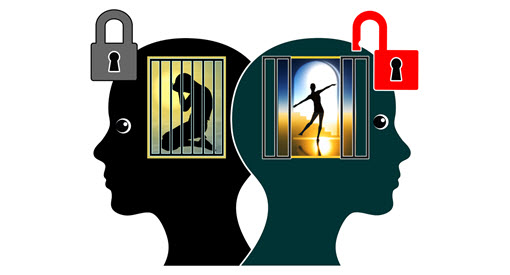
Anxiety and Depression
Fear of Fear
Do you find yourself worrying about anything and everything, fearing that the worst will happen?
Do you dread or avoid situations and people that are unfamiliar to you?
Do racing thoughts make it hard to fall and stay asleep?
Anxiety serves a purpose in people’s lives when it is adaptive and helps improve a person’s functioning and wellbeing. Unhealthy chronic anxiety can impair a person’s functioning and interfere with their well-being as well as cause significant distress.
Facing Fear
 Anxiety makes people feel like worrying about the “dreaded thing” will keep it from happening, when the excessive worrying only robs the worrier of peace and tranquility. Managing anxiety involves facing the feared thing, and not avoiding it.
Anxiety makes people feel like worrying about the “dreaded thing” will keep it from happening, when the excessive worrying only robs the worrier of peace and tranquility. Managing anxiety involves facing the feared thing, and not avoiding it.
Individuals with anxiety symptoms often perform “safety behaviors” during anxiety-provoking situations to make them feel more comfortable, providing temporary relief from their anxiety.
These “safety behaviors” are telling a person’s body that the situation is dangerous, and this reinforces the idea of danger. It is counterintuitive. These safety behaviors actually interfere with the person’s ability to get past their anxiety. The safety behavior leads the body to believe that the situation is much more dangerous than it is.
Worrying – it can be destructive
Tom (a composite of many clients I have worked with), a 45-year-old male, married father of one child, suffered from Generalized Anxiety Disorder. He worried constantly playing the ‘what-if’ game:
“What if I get fired” – “What if I get sick and can’t support my family?” – “What if my wife falls in love with someone else?” – “What if the mole on my back turns into cancer?”
Tom’s anxiety was pervasive, interfered with his peace of mind, and was clearly unproductive. Attempts from family and friends did nothing to help him and left him feeling worse that he could not stop worrying about things.
Tom did not recognize his worrying as an anxiety disorder but felt like his worries were necessary and real. Therapy helped Tom modify his dysfunctional beliefs about worry, reducing his safety behaviors and attempts to control his worry, using problem-solving by helping him identify catastrophic thinking and other dysfunctional thinking patterns, facing his fears, and increasing his tolerance for uncertainty in his life. Tom was able to reduce his excessive worry and gain a sense of competence and improved peace of mind and quality of life.
Everyone feels sad, but depression is something more
You may find it hard to experience any sense of joy, hope, or meaning in your day. There is a heavy feeling in your chest. You are wishing your days away and can’t seem to get any pleasure out of life. There is a feeling of dread that permeates your being, a fear that things will never feel better, and your future feels bleak.
Depression is Highly Treatable
 Fortunately, depression is highly treatable. Psychotherapy is an effective treatment for depression, either alone or in combination with medications. You do not have to continue to suffer this way.
Fortunately, depression is highly treatable. Psychotherapy is an effective treatment for depression, either alone or in combination with medications. You do not have to continue to suffer this way.
Individuals who are struggling with depression often isolate themselves from others. This way of coping with depression only makes things worse. Reaching out for help from a trained professional can turn things around fast.
Depression is highly treatable and can help alleviate the painful symptoms of depression so that you can find a way back to enjoying your life again.
Depression can be caused by several factors (i.e., genetic, biological, psychosocial, social, major life changes, trauma, and stress). A therapist can help you pinpoint which factors might be contributing to depressive symptoms and how to help you recover from depression.
I Can Help You
Whether you are experiencing anxiety of depression, working with me will help you find a new path – a way to eliminate the ‘what-ifs,’ a plan to follow to alleviate the depressive thoughts…
If you are ready to partner with someone who will provide warm, supportive, and empathic guidance, help you heal and recover from your pain, feel free to contact me at (415) 888-8084. You may also fill out the contact information below.
